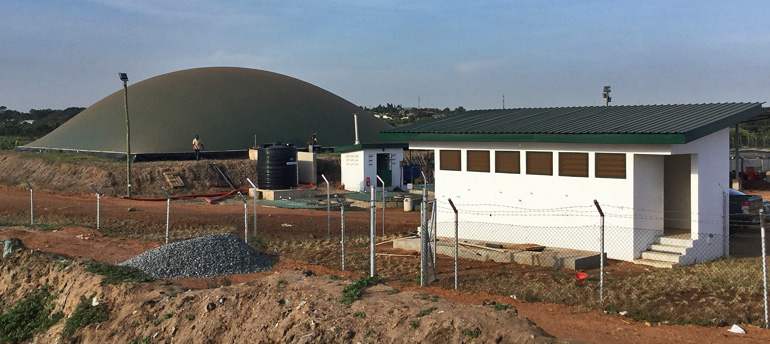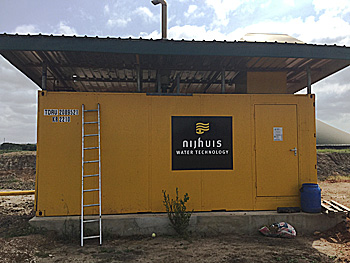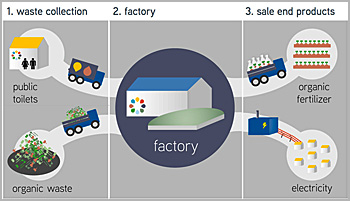Safi Sana installs new digester to expand its waste conversion capacity in Accra, Ghana
 Safi Sana Ghana Limited Company is expanding its faecal sludge treatment facilities in Accra by processing additional waste streams such as solid waste from the Ashaiman marketplace and the Accra abattoir. This enables Safi Sana to generate more energy that can be supplied to the national grid.
Safi Sana Ghana Limited Company is expanding its faecal sludge treatment facilities in Accra by processing additional waste streams such as solid waste from the Ashaiman marketplace and the Accra abattoir. This enables Safi Sana to generate more energy that can be supplied to the national grid.
For this the company completed a second large digestion and cogeneration plant (see top photo) supplied by Dutch company Nijhuis Industries.
The social enterprise runs a simple model that sees it collect faecal substance and solid waste, pass them through its factory machines to manufacture organic fertilizer for agricultural purposes, and energy to sustain the national electricity grid.
 Cogeneration plant that is fueled by biogas and generates electricity.
Cogeneration plant that is fueled by biogas and generates electricity.
More megawatts
“We have a large anaerobic digester”, explained Country manager Raymond Ategbi Okrofu at Safi Sana Ghana, “which has room for all the different strings of waste so it goes through the process of fermentation and the gas is produced, and we direct the gas to power a generator”.
“Presently we are doing almost 1.6 megawatts on a daily basis; but there is the capability to do more if we have clean waste and we enlarge the size of the digester”.
Water re-use
To complete the circular system Safi Sana re-uses the water that is collected from the digester drying beds. This water is used as irrigation water – free of pathogens, full of nutrients - to grow vegetable seedlings in its own greenhouse. The home grown organic fertiliser is used to stimulate the growth. The type of seedlings are selected in close consultation with local farmers and market queens.
 Safi Sana model that uses waste to produce fertilizer and electricity.
Safi Sana model that uses waste to produce fertilizer and electricity.
Replicating to other regions
Okrofu at Safi Sana Ghana said the company’s model to process several waste stream, including the faecal matter from public toilets, is useful and can be scaled or replicated in different regions of the nation.
“Being the initial plant, we were a bit reserved in our design, it can be designed to handle any quantity of waste, but the first plant we have here, it is designed to have 30 metric tons of waste on a daily basis”, he said.
Conglomerate of partners
The technology being used at the company is imported from the Netherlands, and is a scheme of Aqua for All in a conglomerate of commercial and public partners, including Royal HaskoningDHV, Wereld Waternet, African Development Bank and Dutch government, who raised the capital needed to establish the project.
According to Mr. Okrofu, building a similar plant in other regions of the state may cost less, owing to the avoidance of costs such as registration of business and other related services.
Having spent almost three years to finally establish and officially begin operation of the waste management business after a phase of piloting, Safi Sana is optimistic that crafting another system to serve the same purpose on a superior scale, will take less than a year to finish.
This news item is based on an article originally published on the website of Construction Review Online.
Read also on this website
● Stockholm World Water Week 2016: Taking sanitation to the next level, 31 August 2016
● IFAT 2016: A record of 14 water treatment innovations showcased by Nijhuis Industries, 6 June 2016
● AIWW Aquatech 2015: Award winners Salttech and Safi Sana honoured during opening ceremony, 3 November 2015
● Country: Ghana
● Expertise: Water technology & circular economy
More information
Safi Sana Ghana Ltd
Accra, Ghana
+233 302 97 23 80
www.safisana.org/en
Nijhuis Industries
Doetinchem, the Netherlands
+31 314 749 000
www.nijhuisindustries.com



